

|
|
 |
Milo Grow's Letters from the Battle of Fredericksburgh |

|
Here is a glimpse of what poor Fredericksburgh looked like from the Union side of the river. Both sides had cannon pointed onto the town.
(Library of Congress) |
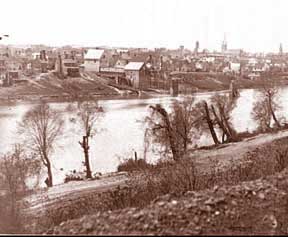 |
| Their batteries are visible over the river about a mile and a half away with their guns yawning at us waiting to belch their thunders forth. |
|
Milo would have read John Bunyan's Pilgrim's Progress with illustrations like this one from an 1821 edition, showing "Christian passing through the Valley of the Shadow of Death." |
My Dear Wife I will now commence on this sheet to give you an extract from a little blank book that I carry in my pocket [Note: This book has never been found.] which will give a better idea of our method of life here than you could get from any other source. It was a long time before I could get a blank book, although I tried often in bookstores and every where. The one I have is home made and is not a nice one, but it holds my ideas as well as a better one. So here is the extract. On this 25th day of November 1862, I made this book as a make shift for a better one after having tried for several months to get a pocket diary without success. I have tried many bookstores and a variety of other sources for a book more to my taste, but have at last come to the conclusion to yield to stern necessity and make this. The object of the book is to write at leisure hours such thoughts as the scenes recurring before me in which I am engaged suggest and to chronicle such facts as my feelings may prompt me to write or as I may think worth remembering. On the 25th day of November 1862, we are encamped don the Rappahannock River within a mile of Fredericksburgh Va., in a valley or ravine in which we are surrounded by a thicket of small oaks and ivy bushes with a small rivulet running at the bottom. The ravine is one of the many such among the pleasant hills which line the beautiful valley of the Rappahannock on each side. On the hill tops we can see the enemy encamped on the range of hills beyond the valley with the smoke of their camp fires overtopping the trees for miles on our right and left. Their batteries are visible over the river about a mile and a half away with their guns yawning at us waiting to belch their thunders forth. Between us lies the beautiful and cultivated valley of the Rappahannock, which takes its course towards the southeast. The river enlivens a scene of rich cultivation and beautiful residences which contrast strangely with the rough and stern aspect of the hostility which surrounds them. On the left towards the west lies the pleasant city of Fredericksburgh, about a mile away. A city of about 16,000 inhabitants, most of whom have now left to avoid the fearful terrors of a bombardment which is now imminently threatened. Three towering spires are visible and a large expanse of residences, fruit trees, and so forth. The streets cannot be seen from here. The scene from the hill one hundred yards in front of our camp is one pleasure, but like John Bunyan's Grim Monster which haunts his path when in full view of the gates of the Celestial City stand the waving flags and gleaming tents and flickering camp fires of the enemy, with their rattling artillery and almost endless trains of wagons casting gloom upon the scene and filling the mind with stern realities, rather than imaginative pleasures. Our camp at nightfall is a busy place, echoing with the fall of axes and the hum of men bringing their wood for their night fire in preparation against damps and colds. The nights are cold and often our blankets are covered at dawn with frost as we lie around our fires. We have no tents and our couch is the bare face of mother earth with perhaps a blanket spread upon it. At night innumerable fires blaze in every direction, our camp fires, around each of which from 7 to 10 men are gathered, cooking their evening repast of fresh beef and flour bread, and then darkling forms in the glimmering light give an air of ghostly life to our ravine. In a long line in each direction our camp fires appear as an offset to the long row of fires beyond the river. Later in the night our ravine seems to be a forest of smoldering fires surrounded by bundles of inanimate life as we lie wrapped in our blankets around them. Here and there stands one by a blaze to warm and drive away the damps and chill of earth and air. So the dawn finds us. |
Oh my Sally was such a maiden fair, --Civil War Marching Song |
| When they over-wintered and had the supplies, soldiers built temporary cities like these log huts. (Library of Congress) | 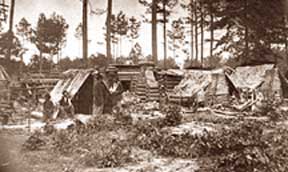 |
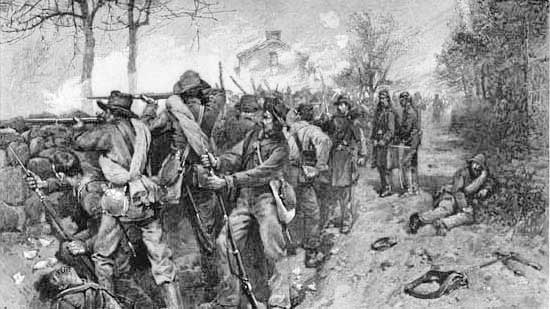
| Confederate soldiers at the stone wall, from a Harper's Magazine engraving. The following letter describes what Milo saw, after "we moved in our position last night" to this very spot. |
| Directly in front of us in full view lies a wounded enemy. He has lain there two days and nights. In vain he struggles to get away towards his friends. He gets up and down again. Then he wraps himself in his blanket and rests after a while to struggle again. It is pleasing to hear our boys commiserate him. Some of them would go to his relief if allowed. By going one would expose himself to the sharpshooters. One cannot get to him from either side without great peril. |
| This photo of men waiting to fill their canteens at Fredericksburgh gives a glimpse of the daily tedium of camp life. | 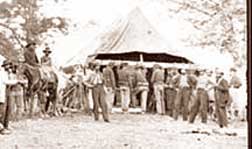 |
| I have just read a very affectionate letter picked up on the field from a Northern lady to her husband. It is dated Nov 20. This battle will cost a world of pangs and sorrow. She will never receive an answer to her affectionate epistle. |
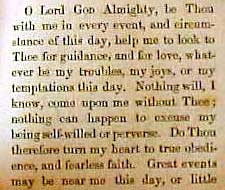 |
Both sides, North and South, sang many of the same songs, quoted the same poetry, longed for the same things, and prayed for victory to the same God -- from devotionals like this 1855 prayerbook. |
| The balloons arose in fine view yesterday. They call in every appurtenance of ingenuity to their help. |
| [Dec. 14 or 16, 1862] |
(First part missing) When their column begins to advance upon us the men will arise fresh for the contest. Now the tide of battle wanes as the enemy amass their column for another attack. We expect them at this point. The opposite heights are studded with batteries and blue with the long lines of men. Their white signal flags are waving and serve to arouse us by their curious and unintelligible [signs?]. Last night I with two other men went far out on the flats of the river near the enemy picket lines. Their signal fires were curious indeed. One seemed constructed by two bright lights, each at the end of a long pole. By the variety of motions given the pole, signals were communicated. The balloons arose in fine view yesterday. They call in every appurtenance of ingenuity to their help. Science assists them, wealth supports them, and genius aids, yet all cannot win in their unrighteous cause. Now the fierce bursting of shells has commenced a hundred yards to my right. None can tell the singular [ ] which these bursting missiles produce [in those who have] witnessed them. After sunset Sunday evening the 16th, [14th?] the battle has ceased for the day. Our position was not attacked. The enemy seems to be engaged in the humane business of carrying away their dead and wounded. Except the firing of an occasional gun in the distance, silence reigns. |
|
Fighting or not, the burials went on every day, for men were dying constantly from disease.
(Library of Congress) |
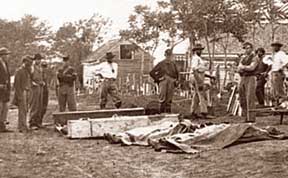 |
| We were relieved last night, the enemy having withdrawn. So the battle of the Rappahannock is ended, not to be renewed soon again here I think. |
| Crockery glassware, cooking utensils, children's and women's clothing were scattered and heaped in fragments about the floor. Every thing of value had been carried away. |
| Dec. 19th [1862] | In camp today. The usual routine of camp duties. Late in the evening we received orders to go on picket and we expect to start about dark. |
| We are held in the reserve today which gives us little opportunity to look about the city. There is a guard out which would arrest me if they catch me, but I do not mind such guards much in my curiosity to see the bombarded place. I frequently avoid and neglect these foolish and discriminating orders, though I may some times be put under arrest. |
| Dec. 20th [1862] |
On picket in the city. The Picket Guard is one that goes out on the outermost posts nearest the enemy and is intended for the protection of the Army. It frequently goes almost to the enemy camps. The enemy pickets are sometimes in gun shot of ours and at times quite severe battles take place between them. The picket force is usually divided into to parts. One is held as a reserve and kept the distance of half a mile, more or less, in the rear of the advance pickets. This is for the support of the advance pickets. Those who go on the advance picket have posts or stands where they stay and watch the movements of the enemy. These posts are frequently in full view of the enemies pickets and firing frequently takes place between them. The posts are hidden if possible. Those who stand on posts are usually relieved every two hours by others who remain a short distance away, and in this way they have opportunity to [rest] and warm and eat. In case of an attack the pickets hold their position and keep the enemy at bay if possible. If the attack force is too large the pickets fall back upon the main body of the army for support. In many cases the pickets do not fire on each other by mutual consent. We are held in the reserve today which gives us little opportunity to look about the city. There is a guard out which would arrest me if they catch me, but I do not mind such guards much in my curiosity to see the bombarded place. I frequently avoid and neglect these foolish and discriminating orders, though I may some times be put under arrest. Twelve holes of balls from cannon appear through the steeple of one elegant church, and bomb shells have burst in it, defacing its elegant furniture and interior. Almost all the houses have ball holes through them and present the same devastation which I have noticed before. The enemy have their guns planted so as to rake every principle street in the city and could [ ] throw a storm of shot and shell through them at any moment. They are in plain view about 1/2 mile away. We pass around the city as though all was peace. The artillery men stand at their guns as though ready to fire but their successes [?] do not deter us. |
Oh I went to bed but it weren't
no use Singin' Polly Wolly Doodle all the day, Cause my feet stuck out for a chicken's roost. Sing Polly Wolly Doodle all the day. |
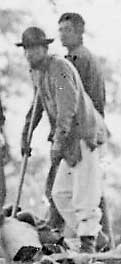 |
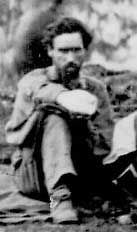 |
Wounded Union soldiers from the battle of Fredericksburgh. |
| The style is confused and given to repetition. It is written amid confusion, and clearness of mind is not incident to camps. |
| Even now while I write the sound of musketry is incessant on our right and left-- the roar of canon is all around. We are expecting an attack at this point before long. |
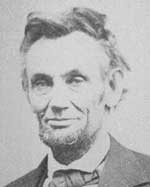 |
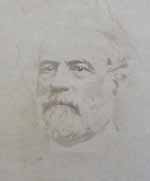 |
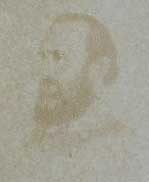 |
| Yesterday Lincoln reviewed them in person, I suppose which caused a good deal of firing a salute. I think the spring is very pleasant here though there is a good deal of wind. |
| I delight to write to you tho I have nothing especial to write. Every little incident that occurs brings you to my mind. |
| My love, I almost always feel under constraint when I write to you thinking that perhaps others may see my letters. To them our warm and heartfelt words might seem foolishness and rather the romance of a boyish lover than the words of matrimony of more than two years standing. I do not think that many know or feel the warm sympathy that exists between us, and it gives me pain to fear that ours may be subjected to their scrutiny or doubts. |
| I am under many obligations to your kind friends for their kindness and considerate love towards you. They have won my love by their kindness towards us both. |
|
Milo had good reason to be thankful for the friends who assisted Kate in his absence. Many of the women living alone in this region -- their husbands away at war -- experienced dire hardships. As reported by Williams in Rich Man's War, by late 1863, thousands of such women wandered the South begging for food for themselves and their children. Food riots broke out in major Southern cities. Their husbands could not get leave from the war to come home and plant crops. In Kate's home town of Colquitt, Georgia, "a group of about fifty soldiers' wives raided the government depot...and took a hundred bushels of corn." Similar attacks took place in nearby Columbus and Thomasville. These destitute women appear to have found little sympathy from those who continued to be well-to-do during the war. (Williams, 114-5) |
My Own dear Lyra, I have an opportunity of sending this to you by Mr. Pate who goes in a day or two, so take pleasure in writing you. I have written six letters to you since I returned and am now looking every day for an answer to some of them. In anxiously expect one, and not a mail comes that I do not go up and see if it brings news from you. It is very cold here yet, and day before yesterday the ground was covered 8 or 10 inches deep with snow. My coat is a great friend. We have been ordered to send off all our baggage that we could not carry all summer. I did not send it because I need it yet and shall trust to chance to get it carried on a wagon. I received the book and testament which you sent by Mr. Boykin and was very glad to get them. My dear, I hope this will find you in good spirits and health. It was truly pleasing to see how heroic you was last year and how you overcame every difficulty. I hope your health will be good and you will be as happy as possible. I have to repeat the same old thing: "keep employed". I am under many obligations to your kind friends for their kindness and considerate love towards you. They have won my love by their kindness towards us both. Give my kindest regards to your mother in particular. She is every way worthy of the love you bear her. She shall ever be my mother as well as yours. Give my love to all the family. The boys are well. Billy is writing and said he is going to send some money home. Buly is in Fredericksburgh, or I expect he would do the same. He does not know of the opportunity. I send this by Mr. Cheshire instead of Mr. Pate. This is some of the ink I made of the copperas you gave me. I wish you would tell me when your father gets the money from Mr. Solomon from George Collier's Estate. You must excuse this bad piece of paper as when I commenced this I had no better. I bought half a quire of paper yesterday for two dollars. They are preparing for inspection which will come on in a few minutes and I must close. Write immediately and receive this from
Your Devoted I could send you ten dollars but think I will send it all together in May. Tell me whether you get your money from Mr. Vann. Milo |
| Now two field officers on their horses gallop up the opposite bank. They have got their glasses and stare looking at us. There are five of them. They have scattered about and are pointing this way. I see their shining bridle bits and sword hilts. |
| ...Last night the stars stood forth in bright array. They seemed like golden jewelry set upon a vestment of deep purpose. Lyra rode green while Venus coyly played hide and seek over the western horizon. |
|
Lyra, the constellation that represented Orpheus' lyre, and thus the mystical source of inspiration, was one of Milo's pet names for Kate. |
Stood picket last night between nine and eleven o'clock and between two and four. The wind blew cold and chilly. I wore my [coat] and blanket and then could not keep warm. During the last part the stars were revelling in their glory. The nights here are not by far so brilliant as in climes further South, though last night the stars stood forth in bright array. They seemed like golden jewelry set upon a vestment of deep purpose. Lyra rode green while Venus coyly played hide and seek over the western horizon. The Dolphin and the Eagle were there. The Bull shone conspicuously, as well as Scorpio, the tail of which is hardly visible in this latitude. The enemy drums beat long and in every direction this morning. Their beat sounds familiar to me and awakens old memories. It reminds me of the time when a boy I went to the muster and, animated by the music I walked proudly and felt myself capable of heroic deeds |
| Your love is a plant that I most carefully nourish. I delight to see its tendrils entwine around me and I know they cannot bind me too tightly, and most gladly do I yield myself to their embrace. Your love ennobles me and your admiration I strive to gain. |
|
April 27th 1863 |
My Beloved Wife I received your charming letter of the 11th just two days ago. I was delighted with it and it afforded me much pleasure. I delayed answering it to take a little time to write out parts of my journals to send along with it. They will both go by the same mail. Your letter pleased me very much. Its words touched my heart on its tender points. Your love and tenderness is the oasis of my life and its expression is always gratifying to me. The witches are not bold enough to try to persuade me that you do not love me enough. I know your heart too well and it was this knowledge that caused me to strive so hard to win it. I then saw in it these treasures of love that were locked up there in store for him to whom you would entrust the key. You gave the key to me, and my dear, not one doubt has since crossed my mind. My confidence has no alloy. You love is the anchor of your heart that holds it fast to the rock it attaches to. I had many anxieties and fears that you guarded the key to that heart of treasures with too jealous an eye to entrust it to my keeping, but when you did freely give it into my hands, it was a moment of joy, and you knew not what resolves I made to cherish it and to make you aware that it was not unworthily bestowed. Your love is a plant that I most carefully nourish. I delight to see its tendrils entwine around me and I know they cannot bind me too tightly, and most gladly do I yield myself to their embrace. Your love ennobles me and your admiration I strive to gain. My dear we have postponed writing our love epistles until after marriage and after we have one son. Our correspondence is more in the style of lovers than that of matrimony. But to me it has this advantage. We now know that our words have a deep meaning and that they are now free from any pretension. Lovers only are not always so well assured on these points, and besides such devotedness at such a time ensures a life of happiness. It puts to flight the assertations of some who say that love only exists between lovers. The theory of my life has been "once a lover always one." You can know this from the fact that I lived to be 35 years old without paying addresses to any lady. I believe in the correctness of my theory quite as much now as formally. I suppose you have received several letters from me before this time. This is the eleventh one that I have sent since my return. I count every envelope I sent. The one containing the history of my journey here. If I sent this separate from the journal, I count them two, which will make twelve. I love to write to you and to hear from you. Your letters are very gratifying to me and it only gives me pain at times to see a vein of sadness in them. If you write to me at all, you cannot conceal this if it exists. I could never conceal from my mother when I wrote to her. She would detect it if I felt it. There is less of it however in your last than in your first letters. Be cheerful, my Lyra, as possible. |
| I am weary of war and long for a place of repose and a quiet time of sympathizing rest. |
|
When you piece together what was happening, it's no wonder Milo is tired, tired of war, and trying to think of rest and nature, and not the many dead of his regiment. It's no wonder he had not had time when he felt like writing--to describe "the last battle." The 51st Georgia fought in Semme's Brigade, McLaw's Division, in the First Corps, and they had just played a major role in the battle of Chancellorsville, adjacent to Fredericksburgh. Confederate Military History, VI, relates: "Semmes' brigade...fought on the line confronting the forward movement of [Northern General] Hooker from Chancellorsville. It was the chief participant in the defeat of Sykes' division of the United States regulars on May 1st, the Fifty-first Georgia [Milo's regiment] bearing the brunt of the fight. Col. W. M. Slaughter, 'the gallant leader of the Fifty-first,' [Milo's commanding officer] received his death-wound early in the action, and a little later Lieut.-Col. Edward Ball was wounded in the head. As the Federal lines gave way on Sunday morning, McLaws and Anderson pressed forward to a union with Jackson's corps.... The brigade now received orders to move down the turnpike in the direction of Fredericksburg to meet the enemy under Sedgwick [at Salem Church], pushing forward they came under severe fire...General Semmes said:' This battle was one of the most severely contested of the war...The brunt of the battle fell upon this brigade....' The brigade during the three days' battles captured 595 prisoners and nearly 1,500 small-arms, and inflicted terrible casualties upon the enemy. Its own loss was very heavy, 577 killed and wounded." (CMH VI, p. 215-6) |
Ever Dear One I have waited with much patience for several days to receive a letter from you but it has not yet come. I wrote a few days since by Standford but am anxious to write again. We are now encamped in a beautiful oak forest on a ridge with water running on each side of us. The weather is now warm and beautiful and our pleasant oak leak shades are very pleasant. The leaves have come out from the buds to full leaf in the last two weeks. Vegetation springs forth with astonishing rapidity when it commences here. The warm weather makes me feel somewhat puny and less vigorous than I was in the early spring. Our regiment is in good health though and fit for service. My little flower wants me to always write after the style of "Rose Leal." How delighted I would be if I could sit with you and talk under some of our oak leaf shades at the roots of a wide spreading tree and tell you all the events of the passing hours, show you the clouds that overshadow me and the bright skys that illumine. Your sympathizing heart would dispel all clouds and brighten every hope. Our words would be of love and its delights, of the bright array of nature, of a glorious one above, then of the thrilling events of war and of the unspeakable hours on the battlefield. We would gain some forest crowned eminence and look over the checkered landscape for miles around interspersed with creek and hill, villa and grove. Then my little flower could be no longer a flower, only beautiful and fragrant to the sense, but a large hearted and sympathizing woman with that flower her warm heart in full bloom-- one whose gushing instincts could comfort and cheer and whose [---] words would stimulate. She would be one the charm of whose warm nature we could feel. The oak leaves are around and above me, everywhere their rustling green sides greet me. It is nature's bower, a place for her free children to rejoice in. I am weary of war and long for a place of repose and a quiet time of sympathizing rest. Have you got the journal I sent from Fredericksburgh. I though I would write you a description of the last battle [Editor's Note: Chancellorsville -- see sidebar] but have not had time when I felt like writing. I hope you are in good health and little Lee is well by this time I hope. From your last letter I expect you are teaching with Mr. Anthony. I am anxious to hear about it. Don't teach at all unless you want to. I expect it is good if you stay all the time in Colquitt. I said in my last letter [this letter has not been found] that I wished you would go to Judge Allen's and spend a few days. I wish you could and would do so. I think the change would benefit you. Buly has entered upon his duties as Lieut. I loaned him forty dollars this morning to buy a sword. He will make a fine officer. Capt. H. [Hopkins] went home very much exasperated with me. He laid John's defeat entirely to me and I understood made several threats about me, telling what he would say about me at home. He is very unpopular with the company. I heard no one say they were sorry he was going to leave. He is a man full of deceit. Neither he nor John went through the last battle. Both left us under color of [darkness?]. Give little Lee a warm kiss from his Pa, and give my love
to all the family. Receive this my dear as an oak leaf from the
bowers of the Rappahannock--by and plucked from the branches
around me-- from your |
An' he sneezed so hard with the
'hoopin' cough Singin' Polly Wolly Doodle all the day, That he sneezed his head an' his tail right off Sing Polly Wolly Doodle all the day. |
| On the margins of the letter dated May 23, 1863: |
I send you the account of the Collier's estate. You can give it to your father and he will know what to do with it. Find out if your father [...] before you give it to him. It is difficult to get stamps in camp. I sent enough for three letters by Stanford. This is the [...] letter I have sent since my return. Do not omit to send envelopes they are 1.00 a bunch here and some paper in every letter. It all helps-- and a few wafers. I have got a little portfolio that I found on the battle field. It is very convenient for me here. I carry it in my knapsack |
| If evil befall us let us be prepared to meet it, if the summer of prosperity attend us may we know how to grace it but above all may the consciousness of confidence and love exist between us which will ensure for us a gushing spring of happiness that the world cannot dry. May the hot and wild siroccoes of the world never wither the green oases of our hearts. |
| Pa will be back again when the war is over and peace is made. You must not forget him as you are his only little boy. |
| [a note to his infant son--Roy Walbridge Grow, aka LeRoy or "Lee"--part of the previous letter?] |
My dear little Lee I received your little letter which you wrote me. Pa wants to see his little son very much. He must be a good boy till Pa gets home again and not give Ma and the others much trouble. He must keep his chickens and raise more so he will have a great many when Pa gets back. Pa will be back again when the war is over and peace is made. You must not forget him as you are his only little boy. You must learn to talk before Pa comes back so as to talk to him. You must love Ma and Grand Ma and Grand Pa and your aunts, they are so kind to you. From your loving father |